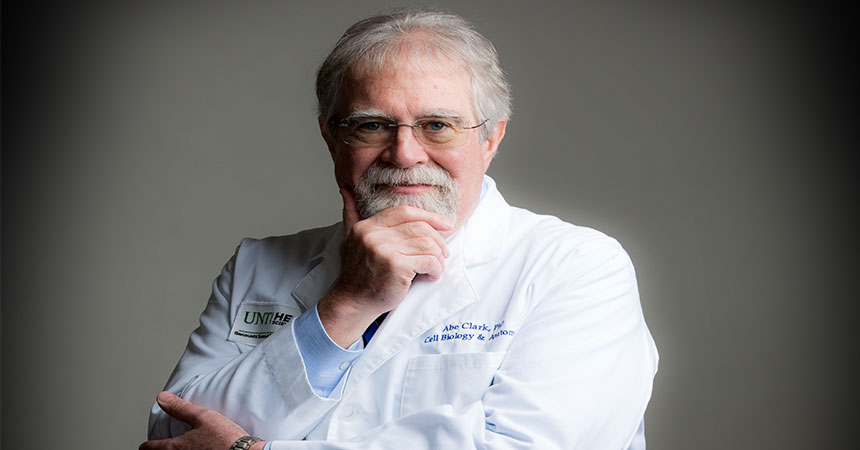A prestigious glaucoma prize, again, for UNTHSC eye researchers
By Jan Jarvis
In 1998, a team of researchers that included Abe Clark, PhD, won worldwide recognition for its discovery of the first gene that causes glaucoma.
Two decades later, the same team has found a possible treatment for this blinding eye disease.
“We’ve gone from discovering the first glaucoma gene to finding a way to treat patients with it,” said Dr. Clark, Regents Professor of Pharmacology & Neuroscience and Executive Director of the North Texas Eye Research Institute.
Both discoveries – in 1998 and 2018 – won the researchers the prestigious Lewis Rudin Glaucoma Prize, which carries a $50,000 award. And both times the honor was shared by researchers at the University of Iowa and UNT Health Science Center, many of whom worked or attended both schools over two decades.
The award highlights the collaborative nature of research, Dr. Clark said.
“It just shows how, in the long term, these collaborations can be very productive,” he said.
For the latest research, scientists focused on myocilin, a protein involved in both juvenile and adult-onset open-angle glaucoma, a condition that causes irreversible vision loss and affects about 2 million people worldwide.
Using CRISPR technology, a genome-editing tool that can alter DNA sequences and modify gene function, researchers were able to eliminate myocilin and lower intraocular pressure to prevent further eye damage in a mouse model that mimics all of the features of open-angle glaucoma in humans.
“We essentially were able to cure glaucoma in this model,” Dr. Clark said.
The next step will be to use the same approach to test if the product is effective and safe in human eyes, Dr. Clark said.
For many years, patients with glaucoma have been treated with drugs that reduce intraocular pressure, but the actual cause of the disease has never been addressed.
“Our approach is to correct the damage and normalize the eye,” Dr. Clark said. “After a single intraocular injection, patients would have normal vision for the rest of their lives.”
The hope is that with further research, which is currently being tested as part of this UNTHSC and Iowa collaboration, the same concept could be applied to other forms of glaucoma.
Reaching the current milestone took 20 years to accomplish, but the next steps should take less time due to the long-standing collaboration between Dr. Clark and Val C. Sheffield, MD, PhD, Carver Chair of Medical Genetics, Professor of Pediatrics and Ophthalmology and Investigator of the Wynn Institute for Vision Research at the University of Iowa.
Also playing significant roles in this discovery and sharing the 2018 Rudin Prize are Gulab Zode, PhD, Assistant Professor at UNTHSC and Ankur Jain, PhD, a former graduate of Dr. Clark who is now doing his postdoc work in the Sheffield lab at Iowa.
“Iowa has the capability of making clinically approved materials, and it has the patients for testing this therapy,” Dr. Clark said. “So this could go right to clinic, once we know this approach is safe.”


![Uyen Sa Nguyen Scaled[58]](https://www.unthsc.edu/newsroom/wp-content/uploads/sites/16/Uyen-Sa-Nguyen-scaled58-145x175.jpg)



Social media